Helmuth von Moltke may refer to:

The Kreisau Circle (1940–1944) was a group of about twenty-five German dissidents in Nazi Germany led by Helmuth James von Moltke, who met at his estate in the rural town of Kreisau, Silesia. The circle was composed of men and a few women from a variety of backgrounds, including those of noble descent, devout Protestants and Catholics, intellectuals, military personnel, socialists and conservatives. Despite their differences, the members of the Kreisau Circle found common interest in their opposition to Hitler's regime on moral and religious grounds. At their meetings, the circle discussed how they would reorganize the German government after the end of the Third Reich.

Albrecht Theodor Emil Graf von Roon was a Prussian soldier and statesman. As Minister of War from 1859 to 1873, Roon, along with Otto von Bismarck and Helmuth von Moltke, was a dominating figure in Prussia's government during the key decade of the 1860s, when a series of successful wars against Denmark, Austria, and France led to German unification under Prussia's leadership. A moderate conservative and supporter of executive monarchy, he was an avid modernizer who worked to improve the efficiency of the army.

The German General Staff, originally the Prussian General Staff and officially the Great General Staff, was a full-time body at the head of the Prussian Army and later, the German Army, responsible for the continuous study of all aspects of war, and for drawing up and reviewing plans for mobilization or campaign. It existed unofficially from 1806, and was formally established by law in 1814, the first general staff in existence. It was distinguished by the formal selection of its officers by intelligence and proven merit rather than patronage or wealth, and by the exhaustive and rigorously structured training which its staff officers undertook.

Helmuth Karl Bernhard Graf von Moltke was a Prussian field marshal. The chief of staff of the Prussian Army for thirty years, he is regarded as the creator of a new, more modern method of directing armies in the field and one of the finest military minds of his generation. He commanded troops in Europe and the Middle East, in the Second Schleswig War, Austro-Prussian War, and Franco-Prussian War. He is described as embodying "Prussian military organization and tactical genius". He was fascinated with railways and pioneered their military use. He is often referred to as Moltke the Elder to distinguish him from his nephew Helmuth von Moltke the Younger, who commanded the German army at the outbreak of the First World War. He is notably the earliest-born human whose recorded voice is preserved, being born in the last year of the 18th century (1800). He made four recordings; two that were recorded in October 1889 are preserved to this day.

Helmuth Johannes Ludwig Graf von Moltke, also known as Moltke the Younger, was a German general and Chief of the Great German General Staff, a member of the House of Moltke. He was also the nephew of GeneralfeldmarschallGraf Helmuth Karl Bernhard von Moltke, who is commonly called "Moltke the Elder" to differentiate the two.
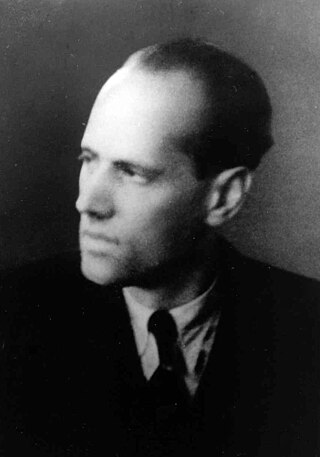
Helmuth James Graf von Moltke was a German jurist who, as a draftee in the German Abwehr, acted to subvert German human-rights abuses of people in territories occupied by Germany during World War II. He was a founding member of the Kreisau Circle opposition group, whose members opposed the government of Adolf Hitler in Nazi Germany, and discussed prospects for a Germany based on moral and democratic principles after Hitler. The Nazis executed him for treason for his participation in these discussions.

The Oberste Heeresleitung was the highest echelon of command of the army (Heer) of the German Empire. In the latter part of World War I, the Third OHL assumed dictatorial powers and became the de facto political authority in the Empire.
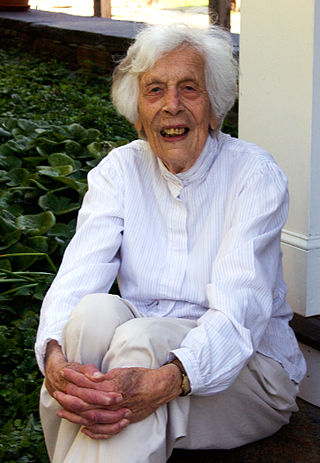
Freya von Moltke was a German American lawyer and participant in the anti-Nazi opposition group, the Kreisau Circle, with her husband, Helmuth James von Moltke. During World War II, her husband acted to subvert German human-rights abuses of people in territories occupied by Germany and became a founding member of the Kreisau Circle, whose members opposed the government of Adolf Hitler.
Annika Mombauer is a historian best known for her work on General Helmuth von Moltke the Younger. She is a Senior Lecturer in Modern European History in the History Department at the Open University in Great Britain, and Associate Dean (Research) for the Arts Faculty.

Peter Graf Yorck von Wartenburg was a German jurist and a member of the German Resistance against Nazism. He studied law and politics in Bonn and Breslau from 1923 to 1926, gaining his doctorate in Breslau in 1927 and passing the civil service entrance examination for lawyers in Berlin in 1930. He married Marion Winter that same year.
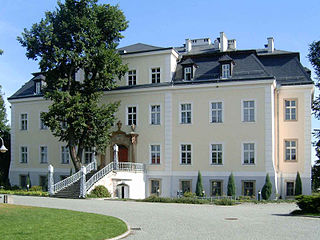
Krzyżowa is a village in the administrative district of Gmina Świdnica, within Świdnica County, Lower Silesian Voivodeship, in southwestern Poland.
Harry Bell was a United States Army Captain received the Medal of Honor for actions during October 17, 1899, during the Philippine–American War for leading a charge against a superior number of the enemy.

Heinrich Graf von Einsiedel was a German journalist, politician and World War II Luftwaffe ace.
Preoccupied with trying to unify the various German states under its banner, Prussia did not participate in the American Civil War. However, several members of the Prussian military served as officers and enlisted men in both armies, just as numerous men who previously immigrated to the United States. Also, official military observers were sent to North America to observe the tactics of both armies, which were later studied by future military leaders of Prussia and then the unified Germany.
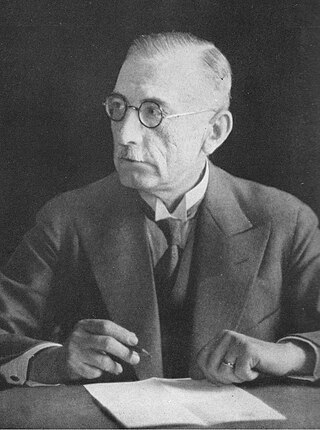
Wilhelm Moritz Egon Freiherr von Gayl was a German jurist and politician of the German National People's Party (DNVP).

Graf Johann Friedrich von der Decken was a Hanoverian general and diplomat during the Napoleonic Wars.
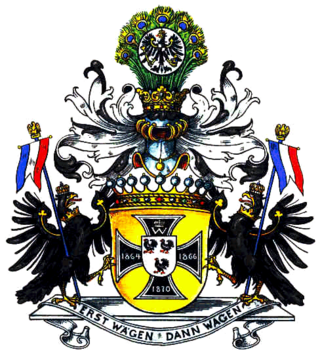
The Moltke family is an old German noble family. The family was originally from Mecklenburg, but apart from Germany, some of the family branches also resided throughout Scandinavia. Members of the family have been noted as statesmen, high-ranking military officers and major landowners in Denmark and Prussia.
The Ministry of War was responsible for war affairs in the Ottoman Empire. The Ottoman land forces were subordinate to this ministry. Within the ministry there were offices for procurement, combat arms, peacetime military affairs, mobilization, and for promotions.
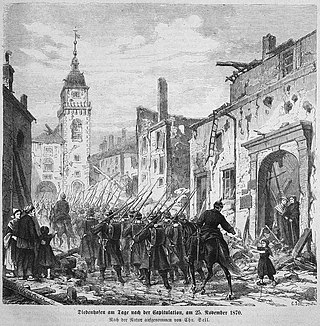
The siege of Thionville was a battle of the Franco-Prussian War which occurred in Thionville of the Moselle from November 13 to November 24, 1870. The small French garrison repulsed an attempted attack on August 14. It was subjected to a blockade and then besieged from November 13. After the capitulation of Metz, on October 28, 1870, the Prussians move part of their powerful artillery to Thionville. Bombed from November 22, the square surrendered on November 24. The capture of Thionville and that of Montmédy a month later gave the Germans control of the railroad to the Picardy front.














